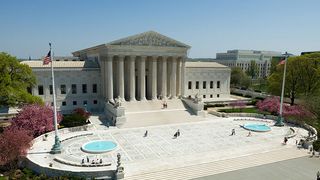Supreme Court Justice Anthony Kennedy Exiting Court

Justice Anthony Kennedy, who has voted with conservatives on recent big decisions, including the travel ban, announced he will be exiting the court at the end of July and some think that a familiar name in D.C. communications circles could be in line for the seat.
Kennedy's exit comes after over 30 years on the High Court, where he was something less than the reliable conservative vote some expected when he was nominated by President Reagan and took his seat in 1988.
Instead he became a swing vote, including for the more liberal wing in favor of gay marriage, affirmative action, and upholding Roe v. Wade.
Related: Cablevision Asks Supreme Court to Review Must-Carry Constitutionality
The President will now have a chance to move the court farther to the right.
Kennedy was also the swing vote in an important decision for cable operators and broadcasters. He wrote the majority decision in the 1997 5-4 ruling in Turner Broadcasting v. FCC upholding the must-carry regime by concluding, as Kennedy put it, that the government "has an independent interest in preserving a multiplicity of broadcasters."
That is the requirement that cable operators carry local TV stations unless TV stations opt to negotiate for retrans payments and fail to reach agreement.
Broadcasting & Cable Newsletter
The smarter way to stay on top of broadcasting and cable industry. Sign up below
Related: Trump Unveils His Supreme Court Candidates
Multichannel News analyzed the court machinations in the key case back in 2004.
And just last week, Kennedy wrote the opinion in another 5-4 decision that opened the door for states to require online retailers without a physical presence in the state to collect and remit taxes on sales to consumers within that state.
The President said he would immediately begin the search for a new justice. Sen. Majority Leader Mitch McConnell (R-Ky.) said Wednesday (June 27) that the Senate would vote on a new nominee this fall.
Republicans were criticized for holding up the confirmation of Barack Obama's nominee for the Scalia seat until Trump took office and could choose conservative Neil Gorsuch.
The Republicans will certainly be trying to hold that vote before the midterms, or at least until the midterm winners are seated in the new year, in case they lose their majority in the Senate.
Who's Next?
Among the names of possible nominees that surfaced last time around was a familiar one in communications circles, U.S. Court of Appeals for the D.C. Circuit judge Brett Kavanaugh. That court is the principal court of jurisdiction for challenges of FCC decisions.
Kavanaugh was said to be close to the top of the list this time around—CNN reported he was likely at the top.
Kavanaugh wrote the majority opinion finding that the FCC was within its authority to seek more input before deciding whether to require broadcasters to simulcast emergency alert information in languages other than English.
He also dissented from the Circuit's decision not to grant IPs request for an en banc review of the decision upholding the FCC's Title II-based internet order. He said the rule was unlawful and should have been vacated.
Kavanaugh was appointed to the circuit in 2006 by President George W. Bush, for whom he had been Assistant to the President and Staff Secretary to the President.
Also on the list last time was Republican Sen. Mike Lee of Utah, who heads the Antitrust Subcommittee and was heading up the Sprint/T-Mobile merger oversight hearing.
Veteran public interest attorney Andrew J. Schwartzman saw Kennedy's departure as a big deal broadly, but with no immediate impact on the communications space.
"This is an earthshaking development for the nation," he said. "It could ensure a conservative orientation on the Supreme Court for decades, as the eldest of the conservative bloc, Justice Clarence Thomas, is only 69.
"However, replacement of Justice Kennedy is unlikely to have a significant impact on First Amendment, media or telecommunications issues over the near-term."
Contributing editor John Eggerton has been an editor and/or writer on media regulation, legislation and policy for over four decades, including covering the FCC, FTC, Congress, the major media trade associations, and the federal courts. In addition to Multichannel News and Broadcasting + Cable, his work has appeared in Radio World, TV Technology, TV Fax, This Week in Consumer Electronics, Variety and the Encyclopedia Britannica.

